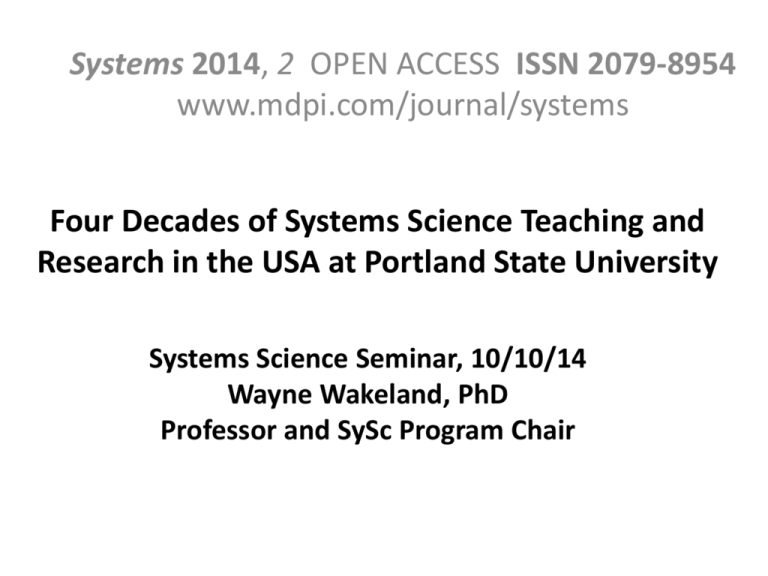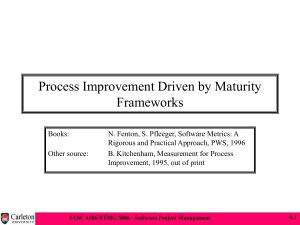Four Decades of Systems Science Teaching and Research in the
advertisement

Systems 2014, 2 OPEN ACCESS ISSN 2079-8954 www.mdpi.com/journal/systems Four Decades of Systems Science Teaching and Research in the USA at Portland State University Systems Science Seminar, 10/10/14 Wayne Wakeland, PhD Professor and SySc Program Chair Systems Science • The study of general principles that govern systems of widely differing types • Use of systems ideas and methods in interdisciplinary / transdisciplinary research and for socio-technical system design and management Some History • 1956 – International Society for the Systems Sciences founded – System dynamics established as a new field • 1967 – First Hawaii International Conference on Systems Sciences • 1970 – International Journal of Systems Science • 1976 – First System Dynamics conference Growing Recognition • Interdisciplinary approaches are needed to solve complex problems • Understanding complex systems is central to advances in science, engineering, real-world problem solving, and interdisciplinary research Example Systems-Oriented Research Institutes Name Focus Foun ded Location International Institute for Applied Systems Analysis Policy-oriented global problems 1972 Vienna, Austria Santa Fe Institute Complex adaptive systems Fe, 1984 Santa NM, USA New England Complex Systems Institute Complex systems 1996 Cambridge, MA, USA Max Plank Institute for Dynamics and Self Organization Complex, selfGottingen, 2003 organizing systems Germany ARC Centre for Complex Complex systems Systems 2004 Australia Systems Science PhD Program • Launched in 1970 – One of PSU’s first three doctoral programs – Along with environmental studies and urban studies • Focal point for integrative, systems-oriented teaching and research • Reported to the Dean of Graduate Studies • Early people… – Lendaris in ‘69 to help create and launch – Linstone in ‘70 as first director – Wakeland matriculated in ’73, graduated in ’77 (#6) – Zwick joined core Faculty in ‘76 Evolution • In the mid-1980s, departmental options created – 9 participating departments • Most popular: ETM, Psychology, School of Bus. Admin. • In early 2000s, ETM & Psych created standalone PhD programs • SySc transitioned to a stand-alone program – – – – Added graduate certificates Added SySc MS degree Added “multi-disciplinary” track Sought to complement not compete with departments • In 2010, began to create an undergraduate presence Systems Practice Systems Research SYSTEMS IDEAS Chaos Theory Fractals Complexity Theory Complex Adaptive Systems / Living Systems Systems Thinking Systems Approach Systems Engineering (to problem solving) SYSTEMS METHODOLOGY Computational Intelligence / Machine Learning Computer Modeling & Simulation Systems Analysis Systems Management S Y S T E M S AP P LI CAT I O N S PSU Systems Science Program Graduate Curriculum Level Name Grad Systems Theory Both Systems Approach (renamed Holistic Strategies for Problem Solving) Grad System Dynamics Role Core Core When? Notes 70’s 70’s added UG section recently Core Methods Elective Elective Methods 80’s Methods Core Methods Elective Core Methods Grad Business Process Modeling & Simulation Methods Grad Manufacturing System Simulation Methods 80’s 90’s Grad Agent Based Simulation Methods 2002 Both Systems Ideas and Sustainability Grad System Sustainability and Organizational Resilience Both Systems Thinking for Business Both Data Mining with Information Theory Elective Elective 2009 2011 Elective Elective 2013 2013 Both Game Theory Grad Artificial Life Grad AI: Neural Networks Grad Discrete System Simulation Grad Quantitative Methods of Systems Science Both Systems Philosophy Grad Discrete Multivariate Models 80’s 80’s 80’s 90’s 90’s 90’s 90’s Added UG section recently Instructor retired; needs revamping Major revision planned to incr. relevance to environ. scientists Added UG section recently Outreach: business Outreach: engineering & technology management Outreach: social science, computer science Added UG section recently Outreach: public policy +UG Outreach: business +UG Outreach: computer science, social science, biomedicine Undergraduate Curriculum Title When Complexity in Science and Technology (from CS) 2009 Models in Science (Fletcher) 2010 Indigenous and Systems Perspectives on Sustainability (Hall) 2011 Intro to Agent Based Modeling (Sotnik) 2012 Modeling Social-ecological Systems (Sotnik) 2012 Networks in Society (Straus, Echt) Decision-Making in Complex Environments (Venkatachalapathy*) 2013 * also developed a prototype course “Darwinian Thought in Society” 2013 Reconstructability Analysis: lattice of models of four variables Example Systems Methods Artificial Neural Network: model with one hidden layer Other Systems Science Programs vs. PSU’s • Dozens of systems science programs created in 60’s and 70’s – Few remain • Binghamton University (SUNY) Systems Science PhD Program has been closely linked with industrial engineering and automation for the past decade • Washington University Systems Science PhD Program is housed in Electrical and Systems Engineering • University of Ottawa has a Systems Science MS degree • Systems-oriented programs in Europe and Australasia mostly focus on systems engineering or mathematical complex systems • Like the above, PSU’s program has connections with engineering, computer science, and mathematics – And also features practitioner focused with applications in biomedicine, health policy, and environmental sustainability Student Population • From 10-20 in early years to over 100 at the peak of the period when the departmental options fluro • Core remained small (10-15) for decades; has grown recently to ~50 (30 doctoral and 20 MS students) Bachelor’s Degrees Master’s Degrees Civil Engr Comp Sci Biology Mathemati cs Systems Science Business Civil Engr. Computer Science Electrical Engr. Economics Systems Engr Education Physics Human Dev Public Admin Math Physics Finance Psychology MBA Annual Graduation Rates, Avg. Student Credit Hours Departmental Ph.D. Graduates SySc Core Ph.D. Graduates SySc MS Graduates Graduate Student Credit Hours Undergraduate Student Credit Hours 1972– 79 1980– 89 1990– 99 2000– 09 2010– 13 0 0.7 2.7 6.2 3.0 1.1 2.0 2.6 1.3 1.3 0 0 0 2.8 6 n/a n/a n/a 900 865 0 0 0 156 480 Recent Externally Funded Research Project Period 1999–2002 2002–2003 2003–2006 Brief Project Description Researcher Role Amt. Adaptive Critics for Controller Design State Space Designs for Aircraft Control Surface Design for Controllers Modeling Intracranial Dynamics in 2003–2006 Pressure Pediatric Traumatic Brain Injury Optimizing IV & V Costs 2003–2006 and Benefits using Simulation Lendaris Lendaris Lendaris Funding Source PI NSF PI NASA PI NSF Thrasher co-PI Research Fund $300K $57K $218K Wakeland co-PI NASA $624K 2008 Zwick PI Wakeland PI Wakeland PI Occam Improvement SD Model for Reducing of Prescription 2009–2011 Risks Drug Abuse and Diversion System Dynamics of 2011–2014 Prescription Opioid Misuse Model of 2014-2017 Dynamic Concussion Recovery Wakeland Wakeland Zwick $320K Wells Fargo $30K Purdue Pharma, $198K L.P. NIH/NIDA Brain PI co-PI Trauma Found. $360K $544K From Dissertation Titles 1972 to 1993 From Dissertation Titles 1994 to 2003 From Dissertation Titles 2004 to 2013 Placement of SySc Grads • Generalist skills are apparently valued by employers – To complement the specific skills they are seeking • Some grads are faculty members at PSU and other universities • Others have started consulting or software development firms • Many work in governmental agencies – E.g., BPA, VA, National Labs • Others work as researchers at public and private enterprises – Healthcare, high technology, energy consulting, etc. • Some teach or serve as administrators in K-12 or community colleges • SySc grads often create their own roles The Future… • The evolution continues: SySc is now part of PSU’s School of the Environment within the College of Liberal Arts and Sciences • Research may shift over time towards environmental concerns and sustainability-related topics – But not to the exclusion of systems methods development, biomedicine, health policy, energy systems, etc. • Being located in a highly interdisciplinary environmental school rather than a specific department seems likely to bode well for SySc – In part because SySc methods can contribute quantitative analysis capabilities for environmental studies, env. science, and env. management students










